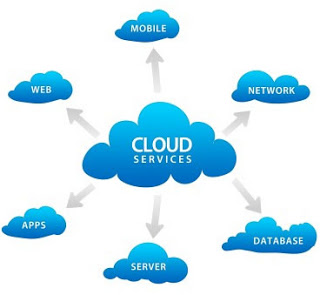What are the benefits you can get from cloud servers?
 |
| Cloud Hosting Services |
Hosting an application on the cloud can be done on either of the three deployment models of the cloud. These are the public, private and hybrid cloud. A public cloud offers rapid access to computing resources at affordable prices as they are owned and operated by multiple organisations, while a private cloud is owned and operated by a single organisation that has enhanced accessibility and performance. The hybrid cloud computing model combines the functionality of private cloud and resourcefulness of public cloud.
What is a cloud hosting service?
Cloud services are basically the process of hosting a website onto a grid connecting multiple servers. Cloud hosting services use the cloud computing technology, which combines the computing power of multiple systems placed at diverse locations. The cloud hosting service creates a virtually automated platform for services over the web that surpasses physical barriers like storage space, infrastructure and load balancing for hosting a website.
The cloud hosting service provided by the web hosting companies are classified into three categories based on the type of service and platform requested by the client. These services are Software as a service (SaaS), Platform as a service (PaaS) and Infrastructure as a service (IaaS). Infrastructure-as-a-Service is similar to Platform-as-a-Service, which allows users to pay only for the space they occupy on the cloud servers.
Advantages of cloud server hosting:
Cloud hosting empowers the users with a plethora of services and customisability features on the clustered load-balanced servers. The major advantages of cloud server hosting are cost-effectiveness and flexibility. However, other benefits of using cloud hosting can be stated as under:
Scalability:
An application hosted on the cloud can easily expand over time, if there is an increase in the amount of resources and space required.Data security and recovery:
The data and information stored on the cloud is secure as there is no loss if the system crashes. The decentralized nature of cloud servers ensure that websites run perfectly even when there are power cuts, natural disasters and server downtimes.Software updates:
Users or clients don't need to worry about any impending software updates as they are taken care of by the cloud service provider.Reduced costs:
Hosting a website on a cloud server is cost-effective as the performance of a cloud server is equivalent to that of a dedicated server and also there are multiple servers on the cloud.Less overheads:
The costs incurred in acquiring a server and hosting a website thereafter is significantly less. Moreover, the clients don't have to bother about having physical space for placing the servers.
Cloud computing has become the current trend of web hosting and online storage, powered by the need to have distributed systems working in a real time environment. Cloud servers also consolidate the amount of resources and time required for maintaining hardware and software, as might be the case while hosting on dedicated or shared servers.
Article Source: eArticlesOnline.com
Labels: Cloud Hosting, cloud hosting service, cloud server hosting, cloud servers, cloud services, cloud solutions, Linux cloud hosting, windows cloud hosting

0 Comments:
Post a Comment
Subscribe to Post Comments [Atom]
<< Home